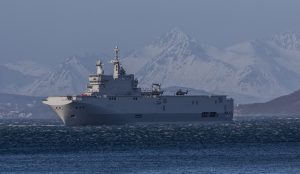France
- History
- Economy
- Arctic Policy
- Recent Publications
- Links
While its historical involvement in the polar regions may appear to favor the Antarctic over the Arctic, France still has a long history of involvement in the Circumpolar North dating back several centuries. French fishing and whaling fleets were active in the North Atlantic as early as the 17th century, and French explorers and voyageurs traveled through the northern parts of what is today Canada even before then. Foreshadowing the strong French scientific presence that would develop in the region, the La Recherche expedition was one of the most famous scientific expeditions of the 19th century—a legacy continued by later polar explorers such as Jean-Baptiste Charcot and Paul-Émile Victor. Today, the French sub-Arctic territory of Saint Pierre et Miquelon is another factor motivating Paris to engage with the region.
Within France, various organizations and governmental agencies have emerged as thought- and policy-leaders regarding the country’s involvement in the Arctic. In 1992, the Institut Polaire Français Paul-Émile Victor (IPEV)—a public interest group composed of nine public and parastatal organizations—was founded. More recently, the French National Centre for Scientific Development (CNRS) created the French Arctic Initiative, which aims to coordinate the scientific activities performed by French universities and laboratories in the region. In 2006, the think-tank Le Cercle Polaire (CP) was founded with the aim of “developing and promoting a true scientific understanding of the Arctic and Antarctic regions, and [encouraging]…the preservation of polar environments.” More recently, the Observatoire de l’Arctique was launched ahead of the publication of the 2016 Arctic Roadmap and is jointly led by the Fondation pour la Recherche Stratégique (FRS) and the Direction Générale des Relations Internationales et de la Stratégie (DGRIS), which is part of the Ministry of Armed Forces. The Observatory monitors trends that may affect France’s strategic interests in the region.
In recognition of the growing importance of the polar regions, France appointed an Ambassador for international negotiations on the polar regions in 2009—at the time the first ambassador-level diplomat appointed specifically for the polar regions by a non-Arctic country. The post is currently held by Olivier Poivre d’Arvor.
In April 2022, France released its new Polar Strategy for 2030. It also announced new funding for existing French Arctic and Antarctic scientific research capabilities, as well as a new Arctic research base: the Tara Polar Station. The strategy notably includes security and geopolitical elements clarifying France’s strategic approach to the Arctic. It also announced the creation of an Interministerial Committee for the Sea and the Poles, placed under the Prime Minister’s authority.
France has been an observer on the Barents Euro-Arctic Council since 1990, acquired Observer status at the Arctic Council in 2000, and is a frequent participant in forums such as the Arctic Circle.
This page was last updated on 1 August 2022. If we have missed anything, please contact info@thearcticinstitute.org.

